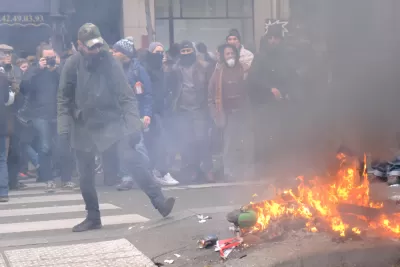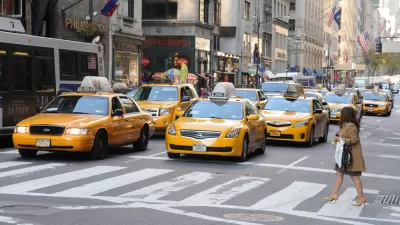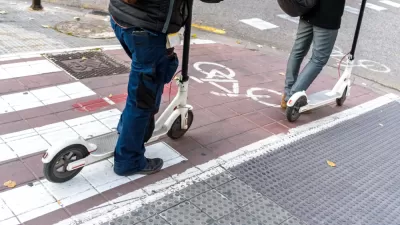Mobility-as-a-service companies have disappeared when essential workers needed them most, falling short of their promoted role as gap fillers.

According to Susie Cagle, public transit systems weren't the only mobility services leaving people stranded during protests and curfews in the past few weeks.
As cities across the country institute a variety of fast-changing curfews in response to protests, they are also cutting back or completely shutting down the public transit countless individuals use each night to make their way home and to work. Even private transportation services like ride shares, which have long advertised themselves as transit solutions by shoring up urban transit and making cities safer and more convenient, are temporarily shuttering.
Private transit companies are complying with shutdown orders in cities, according to Cagle, or even voluntarily suspending service, leaving essential workers without options for getting home and exposing them to the risk of being harassed or even arrested on the way home.
"These are all services that were pitched as making urban transportation more robust, cities more accessible, and residents safer," writes Cagle. "Once hailed as alternatives to the financial burden of private vehicle ownership without giving up safe and consistent mobility, the curfew has revealed that these transportation solutions are only as capable as the municipalities they operate in."
FULL STORY: Uber, Lyft, and Revel Curfew Closures Leave Commuters Stranded

Planetizen Federal Action Tracker
A weekly monitor of how Trump’s orders and actions are impacting planners and planning in America.

Maui's Vacation Rental Debate Turns Ugly
Verbal attacks, misinformation campaigns and fistfights plague a high-stakes debate to convert thousands of vacation rentals into long-term housing.

Restaurant Patios Were a Pandemic Win — Why Were They so Hard to Keep?
Social distancing requirements and changes in travel patterns prompted cities to pilot new uses for street and sidewalk space. Then it got complicated.

In California Battle of Housing vs. Environment, Housing Just Won
A new state law significantly limits the power of CEQA, an environmental review law that served as a powerful tool for blocking new development.

Boulder Eliminates Parking Minimums Citywide
Officials estimate the cost of building a single underground parking space at up to $100,000.

Orange County, Florida Adopts Largest US “Sprawl Repair” Code
The ‘Orange Code’ seeks to rectify decades of sprawl-inducing, car-oriented development.
Urban Design for Planners 1: Software Tools
This six-course series explores essential urban design concepts using open source software and equips planners with the tools they need to participate fully in the urban design process.
Planning for Universal Design
Learn the tools for implementing Universal Design in planning regulations.
Heyer Gruel & Associates PA
JM Goldson LLC
Custer County Colorado
City of Camden Redevelopment Agency
City of Astoria
Transportation Research & Education Center (TREC) at Portland State University
Jefferson Parish Government
Camden Redevelopment Agency
City of Claremont





























